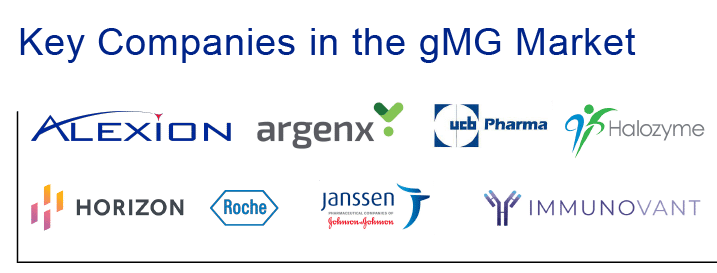Can FcRn Antagonists Be The Game-Changer in the Generalized Myasthenia Gravis (gMG) Treatment Market?
Aug 01, 2022
Table of Contents
Though a rare disease, generalized myasthenia gravis (gMG) still affects around 60,000 people in the US and another 100,000 in EU-5 and Japan.
As per our analysis, the total diagnosed prevalent cases of gMG were approx 116K in the 7MM in 2021. These numbers are further estimated to increase by 2032. Moreover, the number of females affected was twice as compared to males in the US in 2021, and it is estimated that the gMG prevalence will increase in the US by 2032.
Downloads
Click Here To Get the Article in PDF
Recent Articles
- Eisai Announces Solo Development of Farletuzumab Ecteribulin (FZEC); Johnson & Johnson’s Nipo...
- Agios’ PYRUKYND SNDA Accepted by FDA for Thalassemia; BridgeBio’s BBO-8520 Gets FDA Fast Track fo...
- FDA Expands SOLIRIS for Pediatric Myasthenia Gravis; vTv’s Cadisegliatin Program Resumes as FDA L...
- FcRn Inhibitors for Autoimmune Disorders: A Promising Therapeutic Approach
- FcRn Inhibitors Being The Fastest Growing Class, Plans To Get Explored In 20+ Indications
In myasthenia gravis (MG), the immune system produces AChR antibodies that interfere with communication between nerves and muscles, resulting in weakness. Generalized myasthenia gravis diagnosis is measured by serum acetylcholine receptor (AChR) antibody levels, electromyography, and bedside tests (ice pack test, rest test).
Consensus clinical practice guidelines recommend thymectomy (the surgical removal of the thymus gland) as an effective generalized myasthenia gravis treatment for all patients with thymoma and patients aged 10–55 years without thymoma. Most patients with myasthenia gravis develop antibodies to acetylcholine receptors (AChRs); these antibodies bind to AChRs on the postsynaptic membrane at the neuromuscular junction and interrupt the neuromuscular transmission. About 80% of patients with gMG have AChR antibodies and are treated by acetylcholine esterase inhibitors. Pyridostigmine is a cholinesterase inhibitor that is a first-line, symptomatic generalized myasthenia gravis treatment. Other major generalized myasthenia gravis treatments include other AChE inhibitors, corticosteroids, non-steroidal immunosuppressants like azathioprine, plasma exchange, and IV immune globulin. Eculizumab (Soliris®) was the first targeted generalized myasthenia gravis treatment approved for treating anti-antibody-positive AChR-Ab+ gMG patients. It is a first-in-class complement inhibitor (C5) approved in 2017 in the US. SOLIRIS is administered by intravenous infusion every 2 weeks.
Being the first-to-market drug, SOLIRIS pocketed huge sales due to its monopoly and an exorbitant annual cost of therapy of ~USD 470,000 per patient. Moreover, challenges like treatment--associated side-effects, inconsistent efficacy to control exacerbations, and high cost meant a high unmet need for safe, efficacious, and cost-effective generalized myasthenia gravis therapies still exists. To cater to this need, companies around the globe are working to bring innovative generalized myasthenia gravis therapies in the gMG market.
Changing Dynamics of Generalized Myasthenia Gravis Market Landscape
After a long time, the second molecule to enter the generalized myasthenia gravis market was VYVGART (Efgartigimod alfa-fcab). It is the first FcRn antagonist to enter generalized myasthenia gravis treatment market, with a novel MoA and significant efficacy. It is indicated for the treatment of adults with AChR-AB+ gMG in the US and in Japan for the treatment of adults with gMG who do not have sufficient response to the standard of care steroids or non-steroidal immunosuppressive therapies (ISTs).
This was followed by ULTOMIRIS (Ravulizumab) by Alexion Pharmaceuticals. It is the first and only long-acting C5 complement inhibitor, offering immediate, complete, and sustained complement inhibition. It is administered intravenously every 8 weeks in adult patients, following a loading dose. Ravulizumab received US FDA approval in April 2022 under priority review.

Furthermore, the other leading companies such as UCB Biopharma, Horizon Therapeutics, Hoffmann-La Roche, Janssen Research & Development, LLC, Immunovant Sciences GmbH, and others are also actively working in the generalized myasthenia gravis market to improve the treatment outlook.
FcRn Antagonists may lead the Generalized Myasthenia Gravis Market
There is a list of late-stage assets with distinct MoA being developed for treating gMG patients and are expected to enter the United States, EU5 (Germany, Italy, France, Spain, the United Kingdom), and the Japanese generalized myasthenia gravis market in the next few years. Few of the FcRn molecules in development include Rozanolixizumab (UCB Biopharma), SC efgartigimod (Argenx-Halozyme), Nipocalimab (Janssen), and Batoclimab (Immunovant Sciences). The detailed pipeline analysis of the upcoming molecules is mentioned below:
VYVGART (efgartigimod) by Argenx was launched in January 2022 and has pocketed sales beyond estimates in its first quarter (1Q22). Argenx is also developing SC efgartigimod in collaboration with subcutaneous delivery systems’ player, Halozyme, to treat gMG patients. The company announced a positive data readout of its Phase III studies in 2H22. It also announced plans to file BLA by the end of 2022. Argenx also plans to commercialize the asset with a different brand name, as it plans to take a second bite at the generalized myasthenia gravis treatment market. The asset is anticipated to achieve high generalized myasthenia gravis market penetration owing to its long-acting nature and favorable ease of administration. It is expected to enter the US generalized myasthenia gravis treatment market by 2023.
On the other side, UCB Pharma is all-set to compete in the generalized myasthenia gravis market with its FcRn antagonist in subcutaneous formulation, rozanolixizumab. The company announced positive topline results from the Phase III MycarinG study in December 2021. One major advantage of rozanolixizumab is that it is being investigated in overall gMG Class II–IV patients with either AChR or MuSK antibodies.
Another promising FcRn antagonist set to compete in gMG space is nipocalimab. Being developed by Momenta Pharmaceuticals (acquired by J&J in 2020 for USD 6.5 billion), nipocalimab may represent a ‘pipeline-in-a-drug’ as it is being investigated in around 10 rare indications, including MG. The drug’s mechanism to take advantage of the body’s natural mechanism for recycling and removing antibodies from the bloodstream fits the purpose of reducing the amount of IgG in the patient's bloodstream.
Generalized Myasthenia Gravis Treatment Market is all Set to Grow Significantly
The generalized myasthenia gravis market currently accounts for more than USD 2,600 million, as per DelveInsight’s analysis.
New generalized myasthenia gravis treatments, such as FcRn antagonists and B-cell targeted therapies, provide novel generalized myasthenia gravis treatment options for the gMG patients’ refractory to steroids/immunosuppressants. New generalized myasthenia gravis drugs that focus on formulations for ease of administration improve compliance among chronic patients and patients looking for drugs that provide safe and stable responses. This is likely to drive generalized myasthenia gravis treatment market growth in the future. Last but not least, there is an increasing effort by regulatory agencies and patient organizations like Myasthenia Gravis Foundation to create awareness about myasthenia gravis, thus contributing to earlier diagnosis.

FAQs
gMG is a chronic autoimmune neuromuscular disease that causes weakness in the skeletal muscles (voluntary) that worsens after periods of activity and improves after periods of rest. It affects muscles, especially those responsible for controlling the eyes, face, mouth, throat, and limbs.
Myasthenia gravis causes muscle weakness that develops as the affected muscle is engaged. Muscle weakness might come and go because symptoms normally improve with rest. However, the generalized myasthenia gravis symptoms normally worsen with time, reaching their peak within a few years of the disease's inception. The common generalized myasthenia gravis symptoms include weakness of the eye muscle, blurred or double vision, difficult swallowing, shortness of breath, and others.
Generalized myasthenia gravis diagnosis is measured by serum acetylcholine receptor (AChR) antibody levels, electromyography, and bedside tests (ice pack test, rest test).
The leading companies such as Alexion Pharmaceuticals, Argenx, UCB Biopharma, Argenx-Halozyme Therapeutics, Horizon Therapeutics, Hoffmann-La Roche, Janssen Research & Development, LLC, Immunovant Sciences GmbH, and others are actively working in the generalized myasthenia treatment market.
Few of the FcRn molecules in development include Rozanolixizumab (UCB Biopharma), SC efgartigimod (Argenx-Halozyme), Nipocalimab (Janssen), and Batoclimab (Immunovant Sciences).
Downloads
Article in PDF
Recent Articles
- J&J Enters gMG Arena with IMAAVY Approval, Challenging AstraZeneca, Argenx, and UCB
- FDA Expands SOLIRIS for Pediatric Myasthenia Gravis; vTv’s Cadisegliatin Program Resumes as FDA L...
- Eisai Announces Solo Development of Farletuzumab Ecteribulin (FZEC); Johnson & Johnson’s Nipo...
- FDA Approves PENBRAYA for Most Common Serogroups Causing Meningococcal Disease; BIMZELX Approved ...
- Incyte’s Clinical Trial for Myelofibrosis; Eisai and Bioge’s Leqembi; FDA Approves Reata Pharmace...



